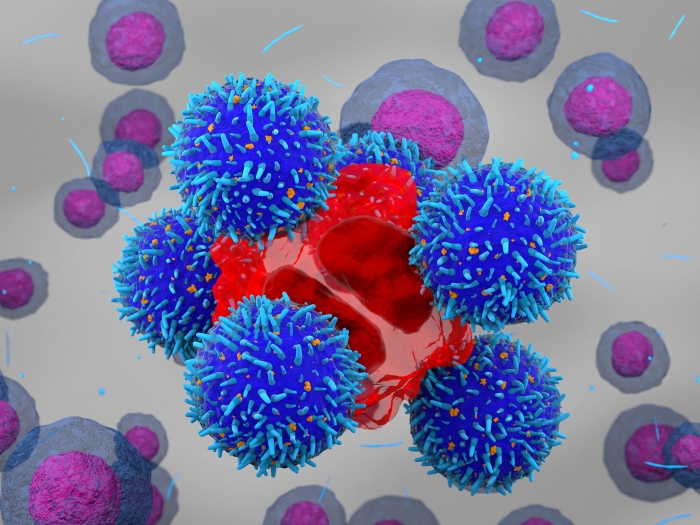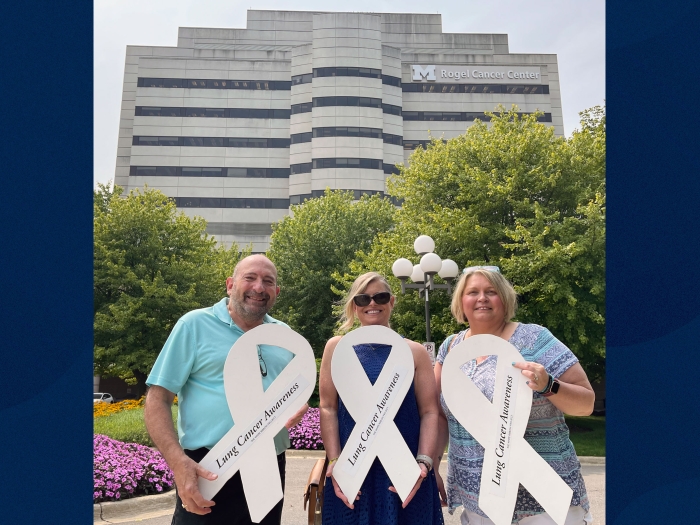The gene signature for renal cancer could help clinicians figure out risk of recurrence sooner and potentially direct treatment for patients
5:00 AM
Author |

Researchers from the University of Michigan Health Rogel Cancer Center have discovered a biomarker that could help identify which renal cancer patients have a higher risk of recurrence.
The findings were published in JCO Precision Oncology.
Kidney cancer accounts for about 3-5% of all cancers; clear cell renal cancer makes up about 75% of all kinds of kidney cancers.
Currently, treatment for clear cell renal cancer is determined based on the size and grade of the tumor and stage of overall disease.
But this “one-size-fits-all” approach isn’t always precise.
“We need biomarkers to identify and better treat those who need to be treated and avoid treatment in those that that do not need to be treated,” said Simpa S. Salami, M.D., M.P.H, associate professor of urology at Michigan Medicine and lead author of the study.
For example, some patients with stage pT3 disease may never develop recurrence after initial treatment with surgery to remove the kidney.
Rather than offer additional, often toxic, systemic therapy to all patients with pT3 disease, a biomarker test that can stratify patients into low versus high risk for recurrence can be used to guide need for additional therapy.
Salami says there’s been no renal cancer biomarker in practice to help clinicians gauge just how aggressive the disease is likely to recur to tailor surveillance strategies as well as need for additional treatment.
Until now.
“We’ve developed a 15-gene signature that can risk-stratify patients with clear cell renal cancer from low to high,” said Salami.
“Even when we adjusted for other clinical variables, like age or grade of tumor, this signature was still independently associated with recurrence after treatment for this form of kidney cancer.”
The team retrospectively identified 110 patients who’d undergone a nephrectomy for clear cell renal cancer and had follow-up after treatment.
They then performed capture transcriptome profiling from archival tissue specimen from these patients.
Through analyzing the RNA sequencing data, they identified a 15-gene signature that was independently associated with recurrence/worse disease-free survival and disease-specific survival.
In two large validation datasets, including data from the Cancer Genome Atlas, the 15-gene signature was independently associated with worse DFS and DSS.
Though more research is needed to define how these findings are implemented in the clinic, Salami says there’s much to be hopeful about.
“There's potential for using this signature to identify patients who should receive low versus high intensity surveillance,” he said.
“It could inform how frequently to do surveillance imaging after initial treatment and, if validated, may be used to guide the selection of patients for additional systemic treatment after surgery.”
Additional authors: Rohit Mehra, Srinivas Nallandhighal, Brittney Cotta, Zayne Knuth, Fengyun Su, Amy Kasputis, Yuping Zhang, Rui Wang, Xuhong Cao, Aaron M. Udager, Saravana M Dhanasekaran, Marcin P. Cieslik, Todd M. Morgan.
Funding: National Comprehensive Cancer Network, University of Michigan Health System-Peking University Health Science Center (UMHS-PUHSC) Joint Institute, and Robert Wood Johnson Foundation as part of the Harold Amos Medical Faculty Development Program (AMFDP).
Paper cited: “Discovery and Validation of a 15-Gene Prognostic Signature for Clear Cell Renal Cell Carcinoma,” JCO Precision Oncology. DOI: 10.1200/PO.23.00565
Live your healthiest life: Get tips from top experts weekly. Subscribe to the Health & Wellness newsletter by Health Lab
Headlines from the frontlines: The power of scientific discovery harnessed and delivered to your inbox every week. Subscribe to Health Lab’s Research & Innovation newsletter
Like Podcasts? Add the Michigan Medicine News Break on Spotify, Apple Podcasts or anywhere you listen to podcasts.

Explore a variety of health care news & stories by visiting the Health Lab home page for more articles.

Department of Communication at Michigan Medicine

Associate Professor
Want top health & research news weekly? Sign up for Health Lab’s newsletters today!





